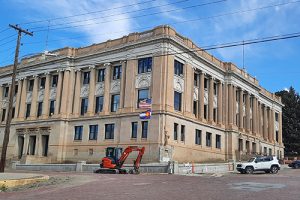By Darrell Arnold
HUERFANO- Most of the work Colorado State Forester Clarence Morey does involves working with local fire departments to make sure they are prepared to fight wildland fires.
He says, "I help them get the training and equipment they need. I work with the county sheriffs on annual operating plans and setting up all the agreements we need to strengthen the fire-fighting capabilities of Huerfano and Las Animas Counties."
Morey is involved in a lot of education, and a lot of work ordering and inspecting equipment. He says, "We do have 11 pieces of equipment loaned to the fire departments that are actually excess military vehicles that we take and refurbish and put fire packages on. We place those with responsible fire departments and train people how to use them. I inspect them every year so they are fire ready and available to be used anywhere they are needed. When they do get a large fire, we provide tactical assistance to the county sheriff’s for fighting those fires."
Firefighting has almost always been an interagency effort, and much of the funding for fighting fires used to come from timber sales on national forest lands.
Says Morey, "The national forests used to have a big budget for forest management and it paid for a lot of fire suppression. But when the sale of timber off of national forests was done away with, that income to the national forests went away, and now they have to rely on different appropriations for their fire suppression budget."
This past winter has seen an uptick in the number of rural and town fires, and Morey thinks he knows the reason for several of them. "People need to be very careful with the ashes they take out of their stoves and fireplaces. We’ve had several sheds and homes catch on fire this winter as a result of the improper disposal of ashes. We’ve had people put ashes in plastic buckets and set them on the rug and walk away. We’ve had people dump ashes out on the ground by the corner of a shed and have the wind come up and catch the shed on fire. The best way to do it is place your ashes in a metal bucket or trash can with a tight-fitting lid that holds them in. Store your ashes for a week or ten days until the heat goes completely out of them before you dump them."
Besides fighting fires, another of Morey’s duties is working with local landowner groups on mitigation issues within their subdivisions. For the last year, Morey has been trying to get all the work done himself, and he simply hasn’t been able to keep up with it. "The biggest negative," he says, "is that some landowners who have asked for help aren’t getting it because of the volume of people I have to deal with. They come and ask me and walk away a little bit disgruntled, but I’ve had people wait from six months to a year for help on things."




